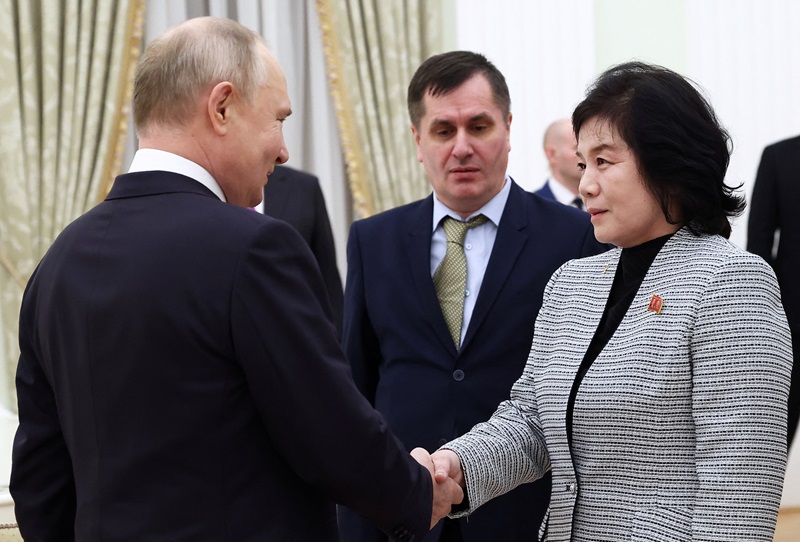
Russia’s top envoy to Pyongyang said that North Korea may decide to conduct a seventh nuclear test if the United States continues taking “provocative steps” in the region.
“I think whether or not there will be another nuclear experiment in North Korea depends on how the military-political situation on the peninsula will unfold,” Russian Ambassador to North Korea Aleksandr Matsegora said in an interview with Russia’s state-controlled TASS news agency Wednesday.
He said that if expanded nuclear deterrence between the United States and South Korea “or other provocative steps,” such as the flying of U.S. strategic bombers over the Korean Peninsula continues, “the North Korean leadership may as well decide to conduct a new nuclear test for the sake of further strengthening of its defense capabilities.”
Matsegora said that responsibility “will lie completely with Washington” and, to a lesser extent, with Seoul.
“Western countries and UN Secretariat officials cannot know a priori if arrangements are underway here for a seventh nuclear test,” Matsegora said, however, addressing allegations that North Korea is working to prepare for another nuclear test.
North Korea’s last nuclear test, the sixth one to date, was conducted in September 2017. Pyongyang, in the past year, has been seen to be rapidly speeding along the development of its nuclear and missile weapons technology.
However, Matsegora noted that North Korea is “not seeking a war” and that whether this “will be a peaceful year in Korea or whether there will be a military conflict depends entirely on the Americans.”
The diplomat also stressed that the “reciprocally beneficial” cooperation between North Korea and Russia is not directed against any third countries and bolsters peace and security.
Responding to a question on military-technical cooperation between the two countries, he said that the “essence of our cooperation in practical fields” is determined by agreements reached by the leaders of Russia and North Korea.
In September 2023, North Korean leader Kim Jong-un and Russian President Vladimir Putin held a rare summit at the Vostochny Cosmodrome, a spaceport in Russia’s Far East.
The two sides are suspected of having made an arms deal as North Korea could potentially provide ammunition to Russia, which has depleted its supply in its war on Ukraine. Pyongyang could have asked for Russian technologies related to nuclear-powered submarines, missiles and satellites, which would violate UN sanctions.
Kim invited Putin to visit Pyongyang during their talks.
Weeks after the summit, North Korea successfully launched a spy satellite into orbit in November after two botched launch attempts in May and August last year.
Since then, Russia and North Korea have flaunted closer ties, with both countries have been openly expressing wariness about the strengthened Seoul-Washington alliance.
Matsegora told TASS that the North believes this year will see a “breakthrough” in Moscow-Pyongyang relations, though he didn’t confirm when Putin might visit Kim.
However, he said that Kim and Putin are likely to sign an extensive package of agreements when they meet, including a deal to mutually facilitate travel by Russians and North Koreans.
Matsegora also pointed out that Pyongyang authorities believe the time for achieving Korean unification has already passed.
He said that North Korean leader Kim “took unprecedented steps once” during the period of détente amid denuclearization dialogue with the United States from 2018 to 2019 “in order to normalize relations with the South.”
However, he said that “none of the agreements on intra-Korean economic cooperation was implemented because Washington was opposed to this and the South did not dare to object” and that “the time is now gone, and there is no way back.”
Russia, a traditional ally of North Korea and a veto-wielding member of the UN Security Council, has frequently been accused of trying to help Pyongyang evade international sanctions.
Russia allegedly allowed the release of $9 million out of $30 million in frozen North Korean assets deposited in a Russian financial institution, according to a New York Times report Tuesday, citing U.S.-allied intelligence officials.
Moscow may also be helping Pyongyang with access to international banking networks in exchange for missiles and ammunition, said the report, helping the North skirt tough UN sanctions.
North Korea reportedly intends to use the released funds to purchase crude oil.
Russian Ambassador to Seoul Georgy Zinoviev told Yonhap News Agency in an interview Wednesday that Russia doesn’t want bilateral relations with South Korea to “hit rock bottom” and called on both sides to “refrain from taking actions that can cause further deterioration” of ties.
This comes after Seoul and Moscow engaged in a diplomatic spat last week after a Russian Foreign Ministry spokesperson said President Yoon Suk Yeol was “blatantly biased” in his critique of North Korea.
BY SARAH KIM [kim.sarah@joongang.co.kr]




